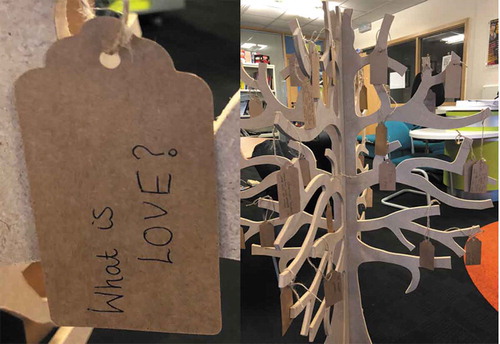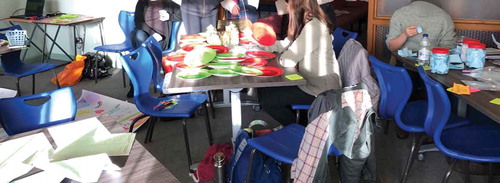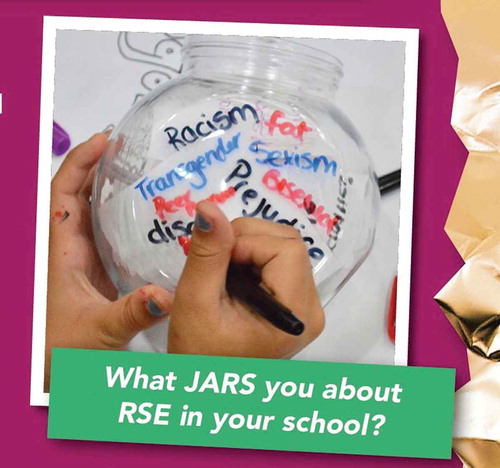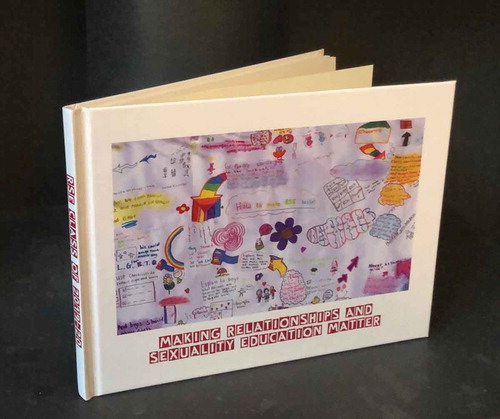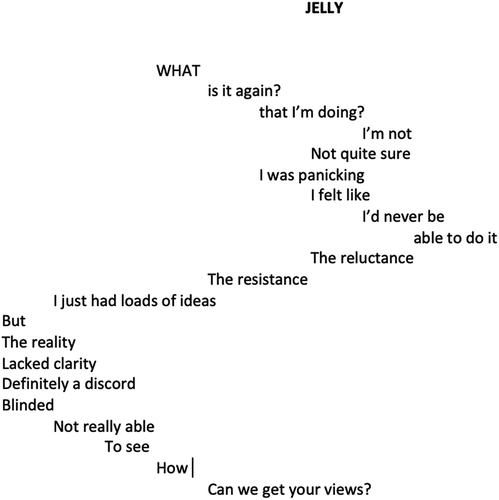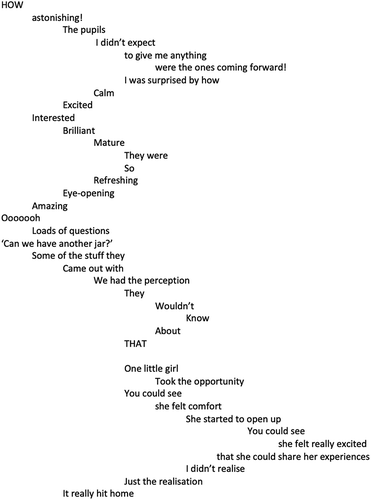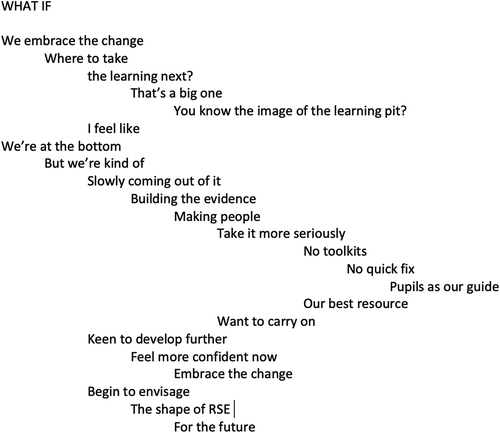ABSTRACT
This paper maps the development of a response-able (Barad 2007), creative professional learning programme for in-service teachers of an unfolding relationships and sexuality education (RSE) curriculum in Wales (UK) where the authors are uniquely and deeply entangled. We chart crucial aspects of the ethical, political and creative praxis informing this journey and explore how the post-qualitative concepts of darta and dartaphacts (Renold 2018), through creative audits facilitated by teachers that surfaced what students know and wonder about RSE, challenge assumptions about ‘what matters’ in RSE for children and young people. We diffractively analyse teachers’ experiences of conducting creative audits across three post-qualitative vignettes and a poem. These dartaphacts-in-the-making offer glimpses at the boundless potential of making student voice matter, which we argue can spark and sustain a co-produced curriculum that comes from and stays close to ‘what matters’.
Introduction
The landscape in which children and young people are navigating the contracting and expanding world of gender, sexuality and relationships is rapidly evolving, often in ways that call relationships and sexuality education policy and practice to account (e.g. Allen and Rasmussen Citation2017, Mayo and Blackburn Citation2019, Jones et al. 2019). For some time, contemporary researchers have been encouraging us to think again how sexuality and relationships are ‘taught, learned, witnessed, affectively charged, embodied, enacted, muted, and resisted by students and educators’ (McClelland and Fine 2017, p. 212). Kathleen Quinlivan (Citation2018, p. 145) has argued, for example, that we must cultivate new possibilities for policy and pedagogy that make `Relationship and Sexuality Education (RSE) more meaningful and relevant for young people, by ‘letting go what adults have already deemed young people need to know about sexuality and relationships’. Yet, with some exceptions (e.g. Lamb and Randazzo Citation2016, Ward Citation2017, Coll et al. Citation2019, Ringrose et al. Citation2019, Wolfe Citation2018, Ging and Neary 2019, Pihkala and Huuki Citation2019, Marston Citation2020), inventive praxes for doing school-based RSE otherwise are often disembodied and disembedded from the political ecology of their situated policy or practice context. In this paper, we respond to this challenge by exploring the ‘What if?’ of doing RSE otherwise in a context where EJ (Author 1) and Ester (Author 3) are uniquely and deeply entangled. In Wales, the site of our engagement, an overhaul of the curriculum has created a moment where the national RSE policy and practice landscape is open to experimentation with what might be possible.
We begin by outlining the conducive context for our work and locate our journey within new materialist/posthuman and post-qualitative inquiry. We then introduce the concepts of ‘darta’ and ‘dartaphact’ (Renold Citation2018) and their capacity to craft and communicate affects, feelings and experiences that matter to children and young people in the sensitive area of RSE. We then share the iterative making of a bespoke teacher professional learning programme in Wales where workshop ‘dataFootnote1’ take on a performative and transformative role, in making a co-produced curriculum come to matter. We end with a speculative commentary regarding the challenges and affordances of becoming entangled in an emergent praxis that operates at both the micro and macro levels of policy and practice, and in ways that cannot easily be predicted.
A conducive context
Following recommendations which draw upon the design of the Scottish curriculum (Donaldson Citation2015, p. 93), the Welsh Government recently overhauled its national curriculum and proposed significant reforms to Relationships and Sexuality Education. Following two reports from a purposefully established Sex and Relationships Expert Panel, chaired by EJ (Renold and McGeeney Citation2017a, Citation2017b), these recommendations unfolded into a proposal for mandatory RSE for all children in Wales aged 3–16. Key changes include the shift from ‘sex’ to the more expansive definition of ‘sexuality’ and the foregrounding of ‘developmentally appropriate’ (rather than ‘age appropriate’) learning around six thematic areas (‘Rights and equity, Relationships, Sex, gender and sexuality, Bodies and body image, Sexual health and well-being and Violence, safety and support’) and across the curriculum, from humanities and the expressive arts to science and technology. Crucially, ‘developmentally appropriate’ is defined in the most recent guidance, not in relation to age categories, as is more commonly observed in RSE curricula, but as practice that ‘will not assume, but attune to and build upon learners’ evolving knowledge and experience’ (Welsh Government Citation2020a, p. 40). Further, it states that learning should be underpinned by a collective whole-school approach and eight embedding principles (Rights and gender-equity based, Empowering, Creative, Co-produced, Holistic, Inclusive, Protective, and Preventative).
These are changes within which EJ and Ester are deeply implicated. For over two decades, EJ has cultivated and sustained an embodied and embedded ethico-political engagement in the field of gender and sexuality education with schools, youth groups, third-sectors, civil servants, and policymakers. Over time, a conducive context has unfolded enabling EJ to forge micro and macro alliances with ‘processual reciprocity’ (Masumi Citation2015, p. 81). A pivotal moment in how EJ became entangled in the formation of a new RSE was in the creation of a Welsh Government sponsored youth-activist gender and sexuality toolkit, ‘AGENDA: Supporting children and young people to make positive relationships matter’ (www.agendaonline.co.uk). Originally co-produced with over 50 young people and key third sector organisations, AGENDA has since evolved as an online resource and outreach programme that invites practitioners to support children and young people to notice, share and call out how human and more-than-human relations and relationships are regulated in the context of social justice, rights, equity and diversity (see Renold Citation2019). AGENDA carefully re-matters youth voice with an affirmative, transformative, and creative praxis that has risen from years of arts-based research, engagement, and activism with young people (e.g. Renold and Ivinson Citation2019, Renold and Ringrose Citation2019).
Ester is an experienced youth practitioner and sexuality researcher new to working in the Welsh context as co-author of the SRE panel reports that have informed the current changes. Based on this work with the expert panel, EJ’s evolving praxis with AGENDA, and EJ’s ongoing role as consultant and advisor to Welsh Government, EJ and Ester were invited by one of the regional education authorities in Wales to develop and facilitate Wales’ first RSE professional learning programme (PLP) for in-service teachers, which is now in its third year – a journey that Max (Author 2) has been mapping in his doctoral research. Below, we provide a brief account of the PLP. First, however, we give space to the theoretical terrain that has informed our praxis and to the concepts of darta and dartaphacts that we are working with in the PLP and in this paper.
Concepts that move our methods: becoming response-able for doing RSE otherwise
In a hyper-rationalist ‘what works’, ‘post-truth’ world, it is an ongoing struggle to experiment with how educational research-engagement-activisms can be enlivened and made to matter. Accordingly, this paper departs from conventional approaches to research and instead offers a speculative creative praxis – an emergent, art-ful theory-doing we loosely describe as post-qualitative (St. Pierre Citation2011, Lather Citation2016). Post-qualitative research, which is informed by new-materialist, posthuman and indigenous approaches to research, scrambles presumed binaries of researcher and participant and the distance between them. Inquiry is recast as a sort of ‘posthuman co-production’ (see Renold and Ivinson, forthcoming) that comes from being-with others (e.g. people, place, objects, etc.), rather than researching ‘about’ or ‘on’ something. It moves research into direct engagement with the world. The explicit attention to the ethical, political, affective and entangled nature of ‘research’ means that research ‘data’ are simultaneously personal, performative and full of transformative potential. In feminist educational research, this praxis is in full swing (see Taylor and Ivinson Citation2013; Ringrose et al. Citation2018), with research that is taking ‘better account for the multiple, entangled, ever-shifting, difference-rich nature of processes of teaching, learning, schooling, and activism’ (Strom et al. Citation2019, p. 1) and drawing from and developing a vibrant legacy attentive to unequal power relations (e.g. Spivak Citation1978, Minh-ha Citation1989; Hooks Citation1994, Anzaldua, Citation1999).
In dialogue with much post-qualitative, posthuman, feminist new-materialist (Strom et al. Citation2019; Murris Citation2020) and indigenous relational scholarship (King et al. Citation2020), Karen Barad’s (Citation2007) concept of ‘response-ability’ has become increasingly central to our inquiry. This concept entangles three main ideas. First, we do not stand outside or apart from what comes to matter. Ontology is epistemology. This means that, in response-able research, the researcher is always already part of the phenomena being investigated, and, therefore, how we come to know is inseparable from research events. Second, what ‘matters’ is an ongoing and dynamic process of differentiation in which agency is not just something possessed by humans. Mattering, then, refers to the process by which natural, social, cultural and technological phenomena intra-actFootnote1 to form life’s becomings (a kind of posthuman agency). In this posthumanising of agency, what happens or what comes to matter is not causal or sequential but involves response-able researchers making an ‘agential cut’ (Barad Citation2007) which has implications for what becomes visible or knowable as research ‘data’ (Coleman et al. Citation2019).
This leads to the third strand. Barad’s onto-epistemology, or how matter comes to attention through an ‘agential cut’, always involves ethical issues of in/justice and in/equity, where matters of concern and matters of care are marbled with power. Response-ability, Barad cautions, is ‘not about the right response, but rather a matter of inviting, welcoming, and enabling the response of the Other’ (Barad, in Kleinman Citation2012, p. 81) and paying attention to the ways in which phenomena are always becoming otherwise. Enabling and welcoming Other ways of being-knowing-responding in the field of relationships and sexuality education (RSE) has multiple implications for us. The response-ability of becoming otherwise in this context involves making space and time for conducting research-engagement-activist projects designed to attune to children and young people’s experiences and creatively and safely communicate these experiences in ever-changing contexts – a process in which the site of engagement is central.
Becoming response-able is always situated in ‘specific histories of particular practices of engagement’ (Barad, in Kleinman Citation2012, p. 81). For us, the iterative unfolding of making a professional learning programme for a new RSE emerged in a specific and conducive socio-political context in Wales – or, following Deleuze and Guattari (Citation1987), a non-linear and rhizomatic ‘RSE policy and practice assemblage’. The Deleuzo-Guattarian concept assemblage is a generative one for us because it allows for a relational and processual analysis of how multiple actants of different types, scales, and forces (people, objects, spaces, affects, discourses etc.) entangle under certain conditions to produce the kinds of posthuman agency we referred to above (Buchanan Citation2020). Unlike most ‘wild policy’ assemblages (see Lea Citation2020) that researchers map from a distance, we, the authors, are differentially entangled in both the ontological and discursive-material formations in this assemblage. As Isabelle Stengers (Citation2019, p. 19) writes, this is not a process where ‘academics’ critique from a ‘safe distance’, this is ‘engagement all the way down’, and involves being there in the thick of things.
Indeed, the past and present practices of engagement that have created the formative conditions of this unfurling policy assemblage include historical legacies of revolution and devolution in Wales/Cymru; a lively history of third sector feminist partnerships; a national Futures and Well-being Act (Welsh Government Citation2015); a national policy on gender-based and sexual violence (Welsh Government Citation2015); a progressive political legacy that legislates for children’s rights, equity and social justice, including a children’s rights-based approach to Sex and Relationships Education (Welsh Government 2010) and, crucially, a radical overhaul of a national curriculum which champions a grass-roots co-construction of ‘what mattersFootnote2’ with teachers, pupils, stakeholders and academics (Donaldson Citation2015). While it is beyond the scope of this paper to detail these past, present and future political legacies and lines of flight, collectively and over time they form a dynamic RSE assemblage of possibility and have tilled the soil the professional learning programme (PLP) took root within as well as enabled an emerging creative praxis, which we introduce in the next section.
Informing RSE with a creative praxis: making darta and dartaphacts matter
The creative praxis that informs the development of the PLP (outlined in the next section) has been distilled in the AGENDA resource through its stARTer activities, which concern the making and mattering of darta and dartaphacts (Renold Citation2018). We theorise darta as the process of using creative methods to craft and communicate experience and dartaphacts as the art-ful objects that carry this experience into new places and spaces. Dartaphacts have the potential to generate a quality of ‘extra-beingness’ (Deleuze and Guattari Citation1987), a multi-dividual, rather than individual, expression of what matters. As an example, one participating teacher conducted a ‘creative audit’ of RSE at her school by asking her 11–12 year old students to write their questions about relationships and sexuality on paper labels, which they then tied to a tree, to help the students share and grow their ideas (see Renold et al. Citation2020a, p. 51). Here, the question-labels are the darta – subsequently reused to help both teachers and schools to build their RSE curriculum – and the tree is the dartaphact, which has since journeyed to conferences, meetings and training events for teachers, researchers and young people to intra-act with (see ).
Through the process of experiencing darta and constructing dartaphacts, teachers are enabled to ‘empirically attune’ (Stewart Citation2014) to children and young people’s experiences of RSE. As Kathleen Stewart (Citation2014) writes, an ‘empirical attunement … . to a thing … produces an opening’ and it is through attuning (in this case to the questions, ideas and experiences of children and young people) that new ways of knowing and methods of doing relationships and sexuality education might flow. Mixing data with art to form the hybrid darta is also an explicit post-qualitative intervention to trouble what counts as measurable data or ‘evidence’ and to foreground the value of creative methodologies (Renold Citation2019). The ‘ph’ replaces ‘f’ in dartaphact, to register the posthuman forces of art-ful objects as proto-political enunciators. The ‘act’ in dartaphact also explicitly signals the ethico-political activist intentions in creating and make visible these multi-vidual expressions of what matters.
In our work, making ‘voice’ matter in all its qualitative multiplicity (see also Mayes Citation2019) has been an integral element in a policy process where young voices are typically absent. In previous work with the Welsh government, for example, EJ and Ester drew on case studies from AGENDA in their evidence report for Welsh Government (Renold and McGeeney Citation2017b) to enliven and illustrate how a holistic ‘living curriculum’ might be enabled when it is informed by the principles of rights, equity, creativity, inclusivity, empowerment, protection and co-production. These are all concepts that started out in the AGENDA resource, and now underpin the statutory RSE framework in Wales, and lie at the heart of our PLP creative praxis.
While many of the activities in the AGENDA resource and the PLP combine creative and arts-based methods (e.g. drama, drawing, dance, poetry), the art in our creative praxis resides in the way an experience, dartaphact or event unfolds (Springgay and Truman Citation2018, Renold and Ivinson Citation2019). It’s a praxis that encourages the co-creation of encounters that facilitate emergent, speculative modes of working where new things might be noticed, felt, made and enacted. We draw directly from Erin Manning’s (Citation2016) medieval rejuvenation of art as process, or the way we engage and become response-able for what emerges. Over the years, dartaphacts co-created with young people in our outreach with schools and youth groups, across invited or created events, workshops, conferences, and social media landscapes have become generative ways of transporting ideas and experiences on sensitive and hidden issues for others to intra-act with (Renold et al. Citation2020b). As we explore below, they have been instrumental in informing the emerging Relationships and Sexuality Education curriculum in Wales.
Crafting a professional learning assemblage for re-mattering ‘what matters’ in RSE
The promised revisions to RSE have been slow to materialise, and the detail of ‘what matters’ in RSE is yet to materialise (with the Covid-19 pandemic further stalling an already stuttering process). The stops and starts of our engagement in the process have, however, provided us with opportunities to develop our own, and Wales’ first RSE professional learning programme from inside this live and still-unfurling RSE policy assemblage. Following Barad, we might conceptualise this as an ethico-political ‘agential cut’ in our praxis of becoming response-able.
The RSE PLP invites in-service teachers from primary, secondary, and special schools in Wales to participate in a range of creative activities that they can experiment with in an initial 2-day workshop and build on when they return to their schools (). The core praxis of the PLP is to find new ways to bring ‘what matters’ to life, by inviting teachers to attune to the complexity of young people’s experiences and to register and re-assemble the dissonance they may feel in doing so. The creative audit is central to this process.
Figure 2. Professional learning programme summary. See Renold et al. Citation2020a, p.15
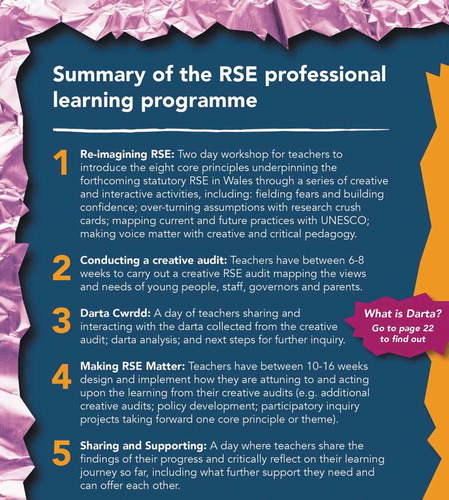
At the end of the initial 2 days of professional learning, teachers plan and facilitate a creative audit in their schools. Informed by the AGENDA stARTer activities, the creative audit asks teachers to use creative activities as a way of listening to what matters to young people about relationships and sexualities. We have used the term ‘audit’ intentionally to simultaneously signal and subvert the neoliberal measuring practices of a school’s ‘audit culture’ via a return to its Latin roots. An audit can open up the ‘listening’ process (aural) to a process of perception (‘au’ – to perceive). In doing so, it subverts and scaffolds accountability on the journey of coming to know differently through creativity as a way (Manning Citation2016) to imagine otherwise.
Presently, the PLP has directly engaged with 37 teachers across 32 schools in Wales, each of whom has conducted a creative audit that has impacted over 550 teachers and over 1500 children and young people. While teachers are free to experiment with their creative audit, we provide them with a series of creative activities that they can use to explore the WHAT, HOW and WHAT IF of RSE with students, staff, governors, and parents. In the final two workshops, teachers share their darta and how they make ‘sense’ (Stengers Citation2019) of their darta with each other and with EJ and Ester. Here, teachers are encouraged to consider what is doable (pragmatic) and possible (speculative), with whom, and how they might share the findings of their creative audit. Collectively, we have seen teachers craft a lively whorl of jars, plates, hearts, trees, runways, wyred, bodies, tubs and more, and shared their findings and dartaphacts at governor meetings, regional conferences, and staff training events ().
Working with the darta produced in the creative audit is ongoing. For this paper, we have intra-acted with the transcribed audio data, drawn from participating teachers’ presentations on their creative audits, and our own embodied memories of being there, via a diffractive analysis where our involvement in the co-production of matter and meaning is kept in flow. As Hillevi Lenz-Taguchi (Citation2012, p. 265) notes, a diffractive analysis is ‘an embodied engagement with the materiality of research data: a becoming-with the data as researcher’. Here, the process of analysis is ensuring that what comes to matter, and the creative (making) and affective (sensory) quality of ‘making-sense’ and ‘sense-making’, stays lively and on the move. Diffractive analysis not only registers ‘new kinds of material-discursive realities’ but in ways ‘that can have transformative and political consequences’ (Lenz-Taguchi Citation2012, p. 265). Our diffractive analysis process enabled us to create new dartaphacts, in this case three vignettesFootnote3 and a poem.Footnote4 It was a process that allowed us to glimpse at how our research with participating teachers is beginning to buzz with possibilities, creating moments where, together, we wondered: ‘what if’ RSE could become otherwise?
Jarring RSE: what else can a jar do?
Jars, as communicative vessels, have long played a central role, carrying and transporting difficult to control and contain substances and objects. Given that RSE deals with sensitive issues that can arouse feelings of anxiety, shame and vulnerability (Gilbert Citation2014, Robinson and Davies Citation2017), we adapted EJ’s AGENDA activity ‘What Jars you?’ in our PLP () to explicitly acknowledge and register those feelings with care (see Renold and Ringrose Citation2019 for further details of the Jar methodology).
At the beginning of the first workshop, each teacher writes what ‘jars’ them about RSE in their schools on pieces of paper and fills a jar with their (anonymous) fears and concerns about RSE. At the end of the day, and throughout the course, EJ and Ester respond to their individual and collective concerns (for those that share the contents of the jars). We then invite teachers to adapt the jar activity as they prepare and conduct a creative audit to listen to the views and experiences of other staff, students, governors and parents, and begin to co-produce their RSE provision. As we go on to explore, the jarring method offers teachers not only a creative method for surfacing their own difficult to articulate thoughts, views, and feelings on a range of RSE issues, but a way to attune to and share how RSE matters and jars in their own contexts.
In the post-qualitative vignettes that follow, we illustrate how the jar method was adapted by three of the teachers in their creative audits. Each vignette provides a glimpse into how the darta moved them: that is, how it sparked feelings or ideas that enabled them to re-imagine new ways of doing RSE. It is worth noting that none of the teachers participating in the PLP had ever conducted a creative audit with children and young people on RSE issues before. We have named each vignette becoming polytical, clutter, and time tubs – a naming process where we experimented with the etymological traces of particular words and objects that seemed to capture the discursive-materiality of the darta (e.g. ‘becoming polytical’ was used to signal the politics of how youth voice was resonating in multiple ways via the adaption of the original jar method using a poly-pocket). We intentionally share each vignette without introduction or immediate interpretation to invite readers to directly explore what else the jarring methodology can do within and across the three vignettes before we offer our own discursive-affective engagements (Dernikos et al. Citation2020). This post-representational analysis may jar some readers, but we hope the direct engagement might enable practitioners to re-purpose these dartaphacts for their own uses. As post-qualitative vignettes, they have not only been crafted for this paper, but are also now informing our praxis with a new cohort of teachers, and as emergent ‘evidence’ for an unfolding curriculum.
Paul Preciado (Citation2019, p. 42), drawing on Édouard Glissant’s concept of the ‘trembling’ [un tremblement] argues, ‘we understand the world better, when we tremble with it, for the world trembles in every direction’. Each vignette we share here has been crafted in ways that might provide a glimpse into the affective effects of how youth ‘voice’, re-mattered as darta in the adapted jarring activities, trembles across a series of crossings in ways that open up RSE ‘in every direction’.
In the first vignette, becoming polytical, the jar method has been adapted as a poly-pocket activity and invites an abundance of all that might come to matter in a new holistic RSE that encompasses ‘history’, ‘geography’, and ‘science’. Polymorphous potentials entangle with the multiple derivatives of ‘pocket’, a cavity to deposit and hold valued, sticky expressions – the sleeve, acting as a protective shield to safely and anonymously store and make visible a multitude of messages that might ‘start conversations’ and begin to open up RSE to its ‘everywhere’ (e.g. from two boys loving each other to racism and Brexit). In ‘clutter’, what trembles in the ‘bothering box’ becomes too much to bear. Early enthusiasm from young people, parents and school governors presents overwhelming challenges. Voice becomes litter, and ‘what matters’ creates unbearable relationalities. But Helen stays with the trouble and continues to bother. She starts in the middle of rainbows, drawing in the whole school to create environments that re-matter respect in ways that begin to structure the chaos so that voices and experiences in all their neuro and physical diversity might grow and bloom. In time tubs, salvaged containers enclose a nexus of potentials (cake? Chocolate? Change?) and manifest a powerful affective force as the time tub dartaphacts are reassembled and opened by hungry teachers in Manod’s classroom – a liminal space where food, socialising, ranting, and raving are all possibilities. Times (the 1980s, ‘now’, earlier, a possible future) ebb and flow throughout Manod’s journey, and percolate within makeshift vessels which keep shifting. Darta is enunciated through tubs which start to ‘thump’ themselves, calling out for a more holistic and comprehensive RSE, than previously imagined.
Each vignette offers a series of eventful moments that chart three individual teacher’s intra-actions with their darta as they find creative ways of sharing newly crafted dartaphacts of experience across the school and the wider community, and to use what comes to matter as the starting point for developing a new, living RSE curriculum. It is a process that ‘becomes a responding, a recalling, a gathering together’ (Stewart Citation2014, p. 120), releasing affective forces that pull into motion the possibilities of how re-mattering youth voice is opening up the ‘What if?’ of an RSE yet to come. The articulation of these collective affective forces focuses the next section.
Beyond measure: what if RSE is everywhere?
In this final section, we share a poem, each line created from teachers’ own words as they reflect upon intra-acting with the darta generated in their creative audits with children and young people. They expressed how they felt about the process with us and the wider group at two key points during the PLP: first, after conducting their creative audit and second, after expanding their creative audit and/or experimenting with how the darta might or has changed their practice in some way. Each line distils a moment of the teachers’ learning journey in which together they were co-creating the very beginnings of an RSE-worlding in the making. Each stanza (WHAT, HOW, WHAT IF) aims to capture significant moments where darta becomes provocation and sets off a series of pedagogical unfoldings. Collectively, we hope the poem might sensitise readers to the ways in which this emerging RSE assemblage of intra-acting with darta is ‘composed and generative, pulling matter and mind into a making: a worlding’ (Stewart Citation2014, p. 119).
Beyond offering an alternative to more traditional approaches of ‘analysing’ and ‘representing’ research data, this poem presents another opportunity to create a dartaphact-in-the-making (see ).
As the section’s title, ‘Beyond Measure’ gestures towards, our intention in sharing teachers’ reflections in this way is to re-imagine accountability (with the creative ‘measurement’ of an audit as poem) within a response-able, post-qualitative praxis. We have called the poem ‘JELLY’ () not only to capture the wobbly and slippery affects and feelings that congeal over time as the teachers become entangled in a process that may be underpinned by a forthcoming statutory structure (i.e. a jelly mould) for a new vision of what RSE could be. It also gestures towards a praxis that remains infused with gnawing awareness that when things get too hot to handle (e.g. as RSE expands in ways that generate anxiety as teachers attune to and step into the unknown), like Jelly meeting hot water, all might rapidly dissolve.CODA
This paper is the first of a series mapping an emerging post-qualitative praxis in our journey of becoming response-able for co-creating a new Relationships and Sexuality Education in Wales where each author has had the unique and rare privilege to inform and continue to make matter. Across each section, we have outlined the arc of a new professional learning programme with a creative approach engaging teachers in a speculative process of ‘What if?’ – that is, what if RSE could become otherwise? We shared these through post-qualitative vignettes and poems as dartaphacts-in-the-making, because in post-qualitative inquiry, everything matters, and these dartaphacts are already being re-mattered in multiple ways for a life beyond this journal article.
In Jarring RSE we explored some of the unanticipated twists and turns of how teachers adapted a jarring activity in ways that re-mattered teacher and ‘pupil voice’. These adaptations were practical (teachers talked about not having the money or time to go and buy or recycle jars and how they grabbed at the resources they had available), affective (inviting and affecting bother, excitement, frustration, concern, passion, connection and so much more) and transformative (shifting what teachers and students see as possible for RSE and setting off a desire to do more with what they are learning – ‘they keep knocking on my door at lunch time’).
In the poem, JELLY, each stanza has been crafted to capture teachers’ discursive reflections of an unfolding journey towards a new holistic, creative, co-produced and rights-based RSE in formation. The first stanza (WHAT, ) attunes to the struggles and anxieties to imagine how teachers’ creative audits might matter-realise into their practice (‘not quite sure’, ‘reluctance’, ‘resistance’, ‘loads of ideas … but’); the second stanza (HOW,) elucidates teachers’ ‘astonishment’, ‘surprise’ and ‘amazement’, as the darta over-turns assumptions on what and how ‘matters’ come to matter to children and young people in ways that open up the transdisciplinary nature of RSE as ‘everywhere’. The third stanza (WHAT IF?, ) gets to the heart of our paper and gestures towards how the process of making what matters with their students propels teachers forward (‘want to carry on’), with a slow unfolding praxis not a resource (‘no quick fix’, ‘no toolkits’) and a ‘confidence’ to ‘build evidence’ with their darta that will help them ‘shape’ and ‘vision’ a new RSE.
These two sections are examples of how across our PLP we attempt to produce what Stengers (Citation2019) calls, ‘sensible events’. A sensible event requires ‘allowing oneself to be touched and allowing what touches you the power to modify the way you relate’ (Stengers Citation2019, p. 16). We speculate that the creative praxis that informs our PLP has enabled an opening up of what RSE might be/come through teachers’ empirical attunement of ‘what matters’ to children and young people. And while we have focused this paper solely upon the very beginnings of this re-orientation in RSE, for us it is already a vital journey to share as Wales’ first in-service RSE professional learning programme. Crucially, here we have sought to remain response-able to ensuring that this academic paper is more than a reflection or theorisation of a process. Becoming response-able demands much more, so that what matters continues to matter. As St. Pierre (Citation2018) suggests ‘the post qualitative inquirer, the inventor, the creator, assumes an affirmative attitude of trust in the world and experiments’ and our affirmative experiments have been both multiple and multi-directional with films (https://vimeo.com/416352195, ), blogs (Renold and McGeeney Citation2020) organic resources that capture our praxis (Renold et al. Citation2020a), and creating and intra-acting with various pan-Wales RSE policy and practice assemblages, including giving written and oral evidence as the new mandatory RSE gains royal assent.Footnote5
Figure 9. Title screen of the film, ‘Making space: transforming relationships and sexuality education in Wales’
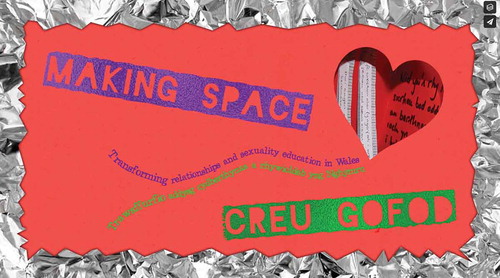
Co-producing a Relationships and Sexuality Education has been and continues to be a bumpy ride. However, its protean status carries emergent cracks and crevices, that have enabled us to craft resources, experiential events, and creative audits, so that ‘what matters’ at a micro grass-roots level, might inform ‘what matters’ at a macro-political level and vice versa. In a way, these are our ‘agential cuts’ within a post-qualitative praxis that will always ‘demand engagement, involving partners for whom such practices matter, not choosy, off-ground, theory-armed onlookers’ (Stengers Citation2019, p. 19). Crucially, as Barad has argued, it is a response-ability that not only involves an enabling of responsiveness but also an ‘iterative reworking of im/possibility’. Indeed, for those working in the risky field of sexuality education, entangling with what is possible and impossible is what becoming response-able with the ‘What if?’ of RSE often demands. It is a rhizomatic process that will always be on the make, and we look forward to how this assemblage continues to evolve in ways that vibrate, shake, uproot, re-route, over-turn, lift and platform ‘what matters’. With darta and dartaphacts as vital collaborators and performative participants, we will continue to experiment with what comes to matter in other as-yet-unknown ways, and in ways that keep the ongoing differentials of ‘What if?’ at play and on the move.
Acknowledgments
We would like to acknowledge and thank all the teachers who have participated in the making and mattering of Wales’ first in-service RSE professional learning programme, designed to prepare teachers for the forthcoming statutory RSE curriculum. Special thanks also to the reviewers for their generative comments, and especially to Dr Katie Strom for her ongoing guidance and extensive support throughout the process.
Disclosure statement
No potential conflict of interest was reported by the authors.
Additional information
Funding
Notes
01 Karen Barad replaces ‘interaction’ with the concept of ‘intra-action’ to radically rework the idea of causality. As EJ has summarised elsewhere, “Barad encourages us not to conceive of change as happening to or from something. Rather, she invites us instead to consider a ‘diffractive’ approach where meaning is always in process, always mattering and always unknown” (Renold Citation2018, p. 39). As Barad argues, ‘with each intra-action, the manifold of entangled relations is reconfigured … there are no singular causes. And there are no individual agents of change. Responsibility is not ours alone’ (Barad, Citation2007, p. 394).
1. This paper draws upon Max Ashton’s ongoing doctoral research mapping teacher and pupil perspectives on Welsh curricular reforms to RSE. Max’s project is funded by the Economic and Social Research Council’s Wales Doctoral Training Partnership. The data that has been drawn upon to create the vignettes and poem in this paper has been generated with teachers participating in the PLP’s second cohort. They were predominantly white Welsh women, aged between twenty-five and sixty. They teach at a wide variety of local authority maintained primary (age 5–11), secondary (age 11–18), special schools (5–18), and through schools (3–18). They included large and culturally diverse city secondary schools to small rural Valleys primary schools, including Welsh-medium schools. No teachers from faith schools participated in this cohort, but the third cohort now includes faith schools, and a more gender, sexuality and ethnically diverse groups of teachers.
2. Wales’ forthcoming national curriculum comprises six Areas of Learning and Experience (AoLEs), alongside five cross-cutting themes including RSE (See Welsh Government Citation2020b). Each AOLE is structured through a series of ‘what matters’ statements across non-linear principles of progression.
3. Each story has been returned to the teacher whose experiences they foreground, in an effort to scaffold iterative consenting appropriately oriented to the complex and yet-unfolding process of becoming-participant (Renold et al. Citation2008). This re-turning has subsequently sparked a new mode of fieldwork for Max, who has invited participating teachers to re-engage with a wider range of vignettes during online interviews – an unexpected development for a phase of ethnographic fieldwork stalled by COVID-19.
4. The poem now features in a short photobook created as a gift (during the COVID-19 lockdown months) for all the teacher participants from the second cohort. Each line is accompanied by images of the darta created and intra-acted (Barad Citation2007) with across the professional learning programme (see ).
5. To follow the developments of Wales’ new and mandatory Relationships and Sexuality Education curriculum as the draft Bill passes into law, including our own submission of written and oral evidence, go to https://business.senedd.wales/mgIssueHistoryHome.aspx?IId=28836 (accessed 12/12/21).
References
- Allen, L. and Rasmussen, M.L., eds, 2017. The Palgrave handbook of sexuality education. London, Buckingham: Palgrave Macmillan.
- Anzaldua, G., 1999. Borderlands: la Frontera. San Francisco: Aunt Lute.
- Barad, K., 2007. Meeting the universe halfway: quantum physics and the entanglement of matter and meaning. Durham: Duke University Press.
- Buchanan, I., 2020. Assemblage theory and method: an introduction and guide. London: Bloomsbury Academic.
- Coleman, R., Page, T., & Palmer, H. 2019. Introduction. Feminist new materialist practice: The mattering of methods. MAI: Feminism & Visual Culture, 4, 1–10.
- Coll, L., Ollis, D., and O’Keeffe, B., 2019. Rebel becomings. In: J.I. Kjaran and H. Saunstson, eds.. Schools as queer transformative spaces: global narratives on sexualities and gender. London: Routledge, 54-69.
- Deleuze, G. and Guattari, F., 1987. A thousand plateaus: capitalism and schizophrenia (B. Massumi, trans.). Minneapolis, MN: University of Minnesota Press.
- Dernikos, N.L., McCall, S.D., and Niccolini, A., eds., 2020. Mapping the affective turn in education: theory, research and pedagogies. Oxon and New York: Routledge, 31–36.
- Donaldson, G. 2015. Successful Futures: Independent Review of Curriculum and Assessment Arrangements in Wales. Wales: Welsh Government.
- Gilbert, J., 2014. Sexuality in school: the limits of education. Minneapolis, MN: University of Minnesota Press.
- Ging, D. And Neary, A. 2019. Gender, Sexuality, and Bullying Special Issue Editorial. Int Journal of Bullying Prevention 1, 227– 230 (2019). https://doi.org/10.1007/s42380-019-00053-3.
- Jones, T., Coll, L., Van Leent, L., and Taylor, Y. 2019. Up-lifting gender and sexuality education research. London: Palgrave Macmillan.
- Hooks, B. 1994. Teaching to Transgress: Education as the Practice of Freedom. London/New York: Routledge.
- King, T.L., Navarro, J., and Smith, A., eds., 2020. Otherwise worlds: against settler colonialism and anti-blackness. Durham, NC: Duke University Press.
- Kleinman, A., 2012. ‘Intra-actions’ (Interview of Karen Barad by Adam Kleinman). Mousse 34, 76–81.
- Lamb, S. and Randazzo, R., 2016. An examination of the effectiveness of a sexual ethics curriculum. Journal of moral education, 45 (1), 16–30. doi:https://doi.org/10.1080/03057240.2016.1156520.
- Lather, P., 2016. Top ten+ list: (re)thinking ontology in (post)qualitative research. Cultural studies ↔ Critical methodologies, 16 (2), 125–131. doi:https://doi.org/10.1177/1532708616634734.
- Lea, T., 2020. Wild policy: indigeneity and the unruly logics of intervention. Stanford, CA: Stanford University Press.
- Manning, E, 2016. The minor gesture. Durham/London: Duke University Press.
- Marston, K. 2020. Exploring young people's digital sexual cultures through creative, visual and arts-based methods. Doctoral dissertation. Cardiff: Cardiff University.
- Massumi, B. 2015. Politics of affect. Cambridge: Polity Press.
- Mayes, E., 2019. The mis/uses of ‘voice’ in (post) qualitative research with children and young people: histories, politics and ethics. International journal of qualitative studies in education, 32 (10), 1191–1209. doi:https://doi.org/10.1080/09518398.2019.1659438.
- Mayo, C. and Blackburn, M.V., 2019. Queer, trans, and intersectional theory in educational practice: student, teacher, and community experiences. New York: Routledge.
- Minh-ha, T., 1989. Woman, native, other: writing postcoloniality and feminism. Bloomington, Indiana: Indiana University Press.
- Murris, K. ed., 2020. Navigating the postqualitative, new materialist and critical posthumanist terrain across disciplines: An introductory guide. London: Routledge.
- Pihkala, S. and Huuki, T., 2019. How A Hashtag Matters–Crafting Response (-Abilities) through Research-Activism on Sexual Harassment in Pre-Teen Peer Cultures. Reconceptualizing Educational Research Methodology, 10(2–3), 242–258.
- Preciado, P.B., 2019. An apartment on Uranus: chronicles of the crossing. Cambridge, MA: MIT Press.
- Quinlivan, K., 2018. Exploring contemporary issues in sexuality education with young people. London: Palgrave Macmillan.
- Renold, E., 2018. ‘Feel what I feel’: making da(r)ta with teen girls for creative activisms on how sexual violence matters. Journal of gender studies, 27 (1), 37–55. doi:https://doi.org/10.1080/09589236.2017.1296352.
- Renold, E., 2019. Becoming AGENDA: the making and Mattering of a youth activist resource on gender and sexual violence, PhEmaterialism special issue. Reconceptualizing educational research methodology, 10 (2–3), 208–241. doi:https://doi.org/10.7577/rerm.3677.
- Renold, E., Holland, S., Ross, N.J., and Hillman, A., 2008. Becoming Participant' Problematizing Informed Consent'in Participatory Research with Young People in Care. Qualitative Social Work, 7 (4), 427–447.
- Renold, E. and Ivinson, G., 2019. Anticipating the more-than: working with prehension in artful interventions with young people in a post-industrial community. Futures, 112, 1–14. doi:https://doi.org/10.1016/j.futures.2019.05.006
- Renold, E. and McGeeney, E., 2017a. The future of the sex and relationships education curriculum in Wales. Wales: Welsh Government.
- Renold, E. and McGeeney, E., 2017b. Informing the future of the sex and relationships education curriculum in Wales. Cardiff: Cardiff University.
- Renold, E. and Ringrose, J., 2019. JARing: making phematerialist research practices matter. MAI: Feminism & Visual Culture. Spring Issue. Available from: https://maifeminism.com/introducing-phematerialism-feminist-posthuman-and-new-materialist-research-methodologies-in-education/ [Accessed 25 November 2020].
- Renold, EJ., McGeeney, E., and Ashton, M.R., 2020. CRUSH: transforming relationships and sexuality education. Cardiff: Cardiff University. Available from: www.agendaonline.co.uk/crush/ [Accessed 24 November 2020].
- Renold, EJ., Edwards, V., and Huuki, T., 2020b. Becoming eventful: making the more-than of a youth activist conference matter. RIDE: Research in drama and education: the journal of applied theatre and performance, 25 (3), 441–464.
- Renold, EJ. and McGeeney, E., 2020. Transforming Relationships and Sexuality Education in Wales, Children in Wales Magazine, Autumn Issue, 6–7.
- Ringrose, J., Whitehead, S., Regehr, K., and Jenkinson, A. 2019. Play-Doh Vulvas and felt tip dick pics: disrupting phallocentric matter(s) in sex education. Reconceptualizing educational research methodology, 10 (2–3), 259–291. doi:https://doi.org/10.7577/rerm.3679.
- Ringrose, J., Warfield, K., and Zarabadi, S., Eds., 2018. Feminist posthumanisms, new materialisms and education. London: Routledge.
- Robinson, K. and Davies, C., 2017. Sexuality education in early childhood. In: L. Allen and M.L. Rasmussen, eds. The Palgrave handbook of sexuality education.London: Buckingham, 217–242.
- Spivak, G., 1978. Feminism and critical theory. Women’s studies international quarterly, 1 (3), 241–246. doi:https://doi.org/10.1016/S0148-0685(78)90170-7.
- Springgay, S. and Truman, S.E., 2018. On the need for methods beyond proceduralism: speculative middles, (in)tensions, and response-ability in research. Qualitative Inquiry, 24 (3), 203–214. doi:https://doi.org/10.1177/1077800417704464.
- St. Pierre, E.A., 2011. Post qualitative research: the critique and the coming after. In: N.K. Denzin and Y.S. Lincoln, eds., Sage handbook of qualitative inquiry. 4th ed. Los Angeles, CA: Sage, 611–635.
- St. Pierre, E.A., 2018. Post qualitative inquiry in an ontology of immanence. Qualitative inquiry, 25 (1), 3–16. doi:https://doi.org/10.1177/1077800418772634.
- Stengers, I., 2019. Putting problematization to the test of our present. Theory, culture and society. 026327641984806. OnlineFirst. doi:https://doi.org/10.1177/0263276419848061.
- Stewart, K., 2014. Tactile Compositions. In: P. Harvey, et al., eds., Objects and materials: a Routledge companion. London: Routledge, 119–127.
- Strom, K., Ringrose, J., Osgood, J., and Renold, E. 2020. PhEmaterialism editorial. Reconceptualizing educational research methodology, 10 (2–3), 1–39. doi:https://doi.org/10.7577/rerm.3649.
- Taguchi, H.L., 2012. A diffractive and Deleuzian approach to analysing interview data. Feminist theory, 13 (3), 265–281.
- Taylor, C.A. and Ivinson, G., 2013. Material feminisms: new directions for education. Gender and education, 25 (6), 665–670. doi:https://doi.org/10.1080/09540253.2013.834617.
- Ward, R., 2017. ‘I just want to be myself’: how we can challenge homophobia, transphobia, and racism in Australian schools. Journal of intercultural studies, 38 (4), 469–479. doi:https://doi.org/10.1080/07256868.2017.1341397.
- Welsh Government, 2015. Violence against women and girls, domestic abuse and sexual violence (Wales) act 2015. Wales: Welsh Government.
- Welsh Government. 2020a. Cross-cutting themes for designing your curriculum. Hwb. [Online]. Available from: https://hwb.gov.wales/curriculum-for-wales/designing-your-curriculum/cross-cutting-themes-for-designing-your-curriculum [Accessed 8 October 2020].
- Welsh Government, 2020b. Curriculum guidance for schools. Wales: Welsh Government.
- Wolfe, M.J., 2018. Materialising effects of difference in sex education: the ‘absurd’ banana penis. Gender and Education, 30 (8), 1065–1077.

